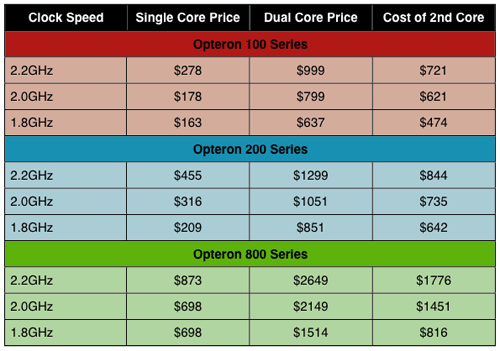AMD's dual core Opteron & Athlon 64 X2 - Server/Desktop Performance Preview
by Anand Lal Shimpi, Jason Clark & Ross Whitehead on April 21, 2005 9:25 AM EST- Posted in
- CPUs
The Lineup - Opteron x75
Prior to the dual core frenzy, multiprocessor servers and workstations were referred to by the number of processors that they had. A two-processor workstation would be called a 2-way workstation, and a four-processor server would be called a 4-way server.Both AMD and Intel sell their server/workstation CPUs not only according to performance characteristics (clock speed, cache size, FSB frequency), but also according to the types of systems for which they were designed. For example, the Opteron 252 and Opteron 852 both run at 2.6GHz, but the 252 is for use in up to 2-way configurations, while the 852 is certified for use in 4- and 8-way configurations. The two chips are identical; it's just that one has been run through additional validation and costs a lot more. As you may remember, the first digit in the Opteron's model number denotes the sorts of configurations for which the CPU is validated. So, the 100 series is uniprocessor only, the 200 series works in up to 2-way configurations and the 800 series is certified for 4+ way configurations.
AMD's dual core server/workstation CPUs will still carry the Opteron brand, but they will feature higher model numbers; and while single core Opterons increased in model numbers by 2 points for each increase in clock speed, dual core Opterons will increase by 5s. With each "processor" being dual core, AMD will start referring to their Opterons by the number of sockets for which they are designed. For example, the Opteron 100 series will be designed for use in 1-socket systems, the Opteron 200 series will be designed for use in up to 2-socket systems and the Opteron 800 series will be designed for use in 4 or more socket systems.
There are three new members of the Opteron family - all dual core CPUs: the Opteron x65, Opteron x70 and Opteron x75.

- The fastest dual core runs at 2.2GHz, two speed grades lower than the fastest single core CPU - not too shabby at all.
- The slowest dual core CPU is priced at the same level as the fastest single core CPU; in this case, $637.
- Unlike Intel, AMD's second core comes at a much higher price. Take a look at the 148 vs. 175. Both run at 2.2GHz, but the dual core chip is over 3.5x the price of the single core CPU.


While AMD will undoubtedly hate the comparison below, it's an interesting one nonetheless. How much are you paying for that second core on these new dual core Opterons? To find out, let's compare prices on a clock for clock basis:











144 Comments
View All Comments
morcegovermelho - Thursday, April 21, 2005 - link
page 3 "For example, the Opteron 252 and Opteron 852 both run at 2.6GHz, but the 252 is for use in up to 2-way configurations, while the 852 is certified for use in 4- and 8-way configurations. The two chips are identical; it's just that one has been run through additional validation and costs a lot more. "I thought that they had different number of HyperTransport (HT) links:
152 - 1 HT
252 - 2 HT
852 - 3 HT
I thought that was the reason why it was impossible to use two 152s in a two-way motherboard.
Maybe i'm wrong.
faboloso112 - Thursday, April 21, 2005 - link
great articlefungmak - Thursday, April 21, 2005 - link
#50Dual 875s have 4 cores
stmok - Thursday, April 21, 2005 - link
I have waited SOOOOO long! Finally, a reason to dump my dual PIII setups. Next stop, Athlon64 X2!jediknight - Thursday, April 21, 2005 - link
Can someone explain the huge performance difference between the dual Operaon 252s (2.6GHz) and the dual Opteron 875 (2.2GHz)?Since:
"The two chips are identical; it's just that one has been run through additional validation and costs a lot more"
I would expect the 252s, running at 400MHz more, would outperform the 875s. Can someone explain this (large) discrepency?
snedzad - Thursday, April 21, 2005 - link
Yes. That's gonna be a four proc-machine. Terrific.I am really astonished about whole AMD K8 architecture. And K9 should be 4-core processor architecture.
Can't wait.
But, I still won't get a rid of my AX2600 machine.
Griswold - Thursday, April 21, 2005 - link
Ah the brilliant KillerBob.Anand used plenty of real world apps for the multitask benchmarks.
How much more real world testing would you want to go with your (pointless) whining?
GoatHerderEd - Thursday, April 21, 2005 - link
Why is their stock price at a 6 month low? I hope this pulls it up a bit. It would be a shame if they don’t start making a profit.suryad - Thursday, April 21, 2005 - link
I just am astounded at the performance these first versions of dual core processing that is being presented to us...WOW...couple that with a well written 64 bit OS and it will be even more smoking!! I think AMD did a job extremely well done and I am glad that they are being aggressive in keeping their pockets full with the prices of their chips. I personally dont think that would stop me from buying their processors. I would wait for the FX to become dual core though. A 3 ghz dual core FX would rock so bad!!!Also one more thing...so the Tyan mobo holds 2 procs correct? So if we stuck a dual core in 1 socket and another in the other sock...that makes it a 4 proc machine then right?!!
bldckstark - Thursday, April 21, 2005 - link
Thanks for the double post KillerBob. Your statements are as intelligent as your ability to use a keyboard.